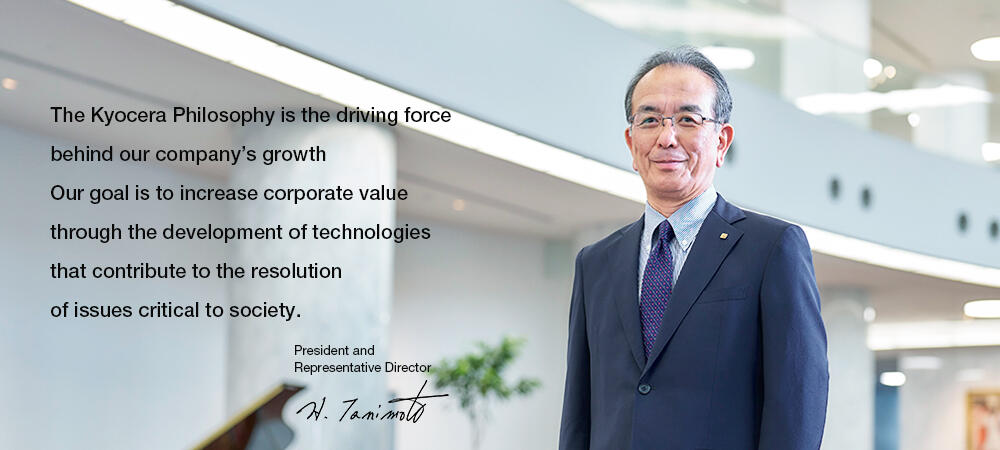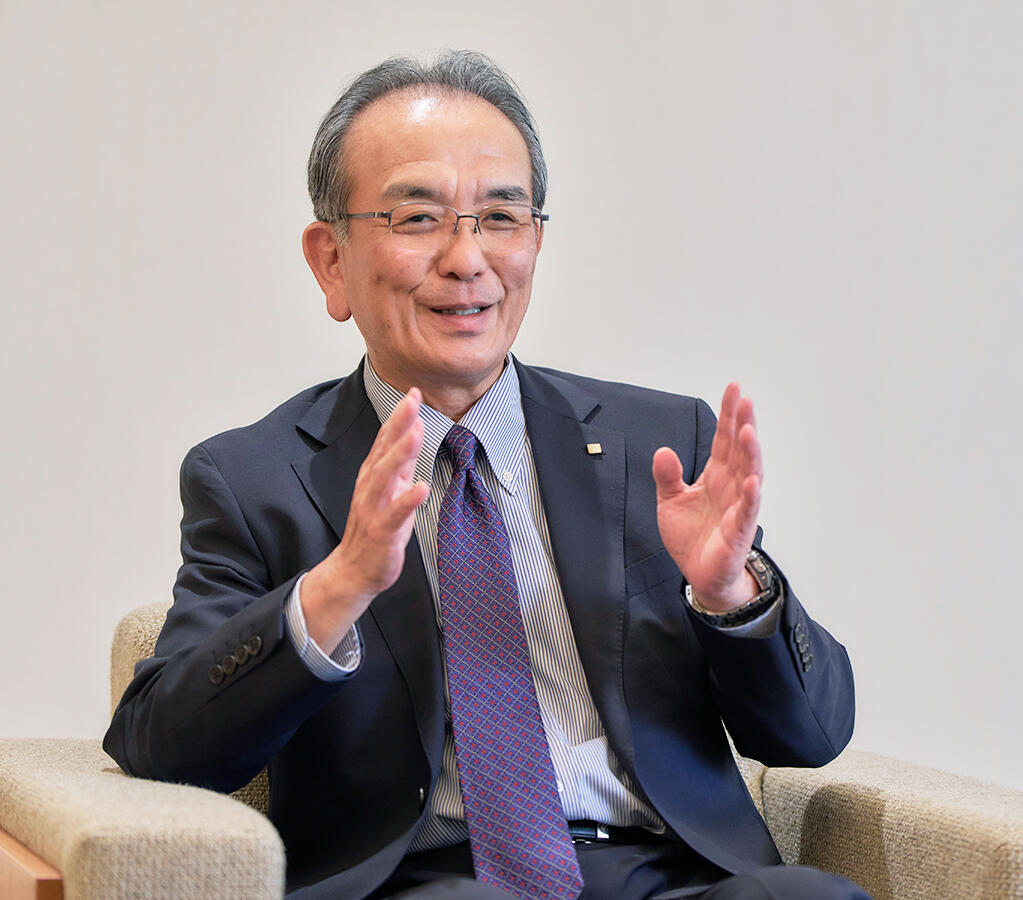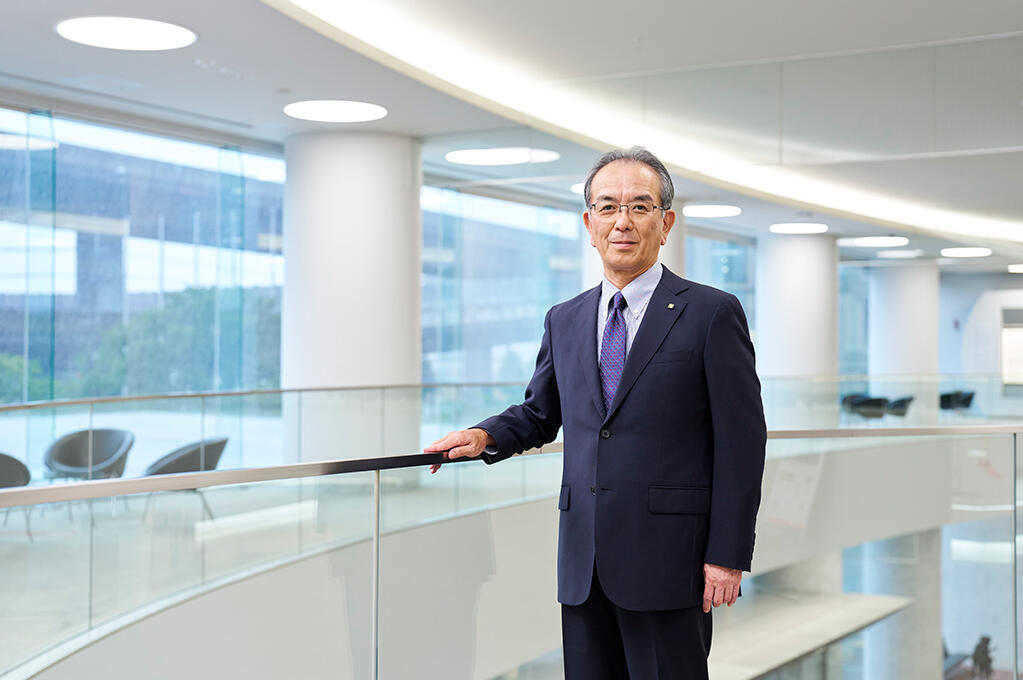Top Management Message

Business Forecast
Aiming to improve profitability through the reorganization of businesses facing challenges
In the fiscal year ending March 2025, we reported disappointing results. While we saw a slight increase in sales, we experienced a significant decrease in profit. About 80% of this decrease was in the organic packaging business for semiconductor-related components and at KYOCERA AVX (KAVX), our electronic components subsidiary in the United States. In the organic packaging business, we committed large-scale investments to increase production of organic packages for general-purpose data centers, which we had planned in response to growing demand. However, we were forced to record an impairment as demand shifted to AI data centers. In addition, KAVX recorded a loss due to a decline in the utilization rate at a new plant caused by sluggish market conditions, which were especially evident in the European automotive market.
In the fiscal year ending March 2026, we recognize that returning these two businesses to a recovery trend is a top priority. In the organic packaging business, in addition to a decrease in depreciation and amortization expenses due to losses, we believe that we are on track for a return to profitability as we have seen a recovery in demand in some areas. Since last year, we have been dispatching engineers from the Electronic Components Division to KAVX production bases outside Japan to rebuild the business, and we have recorded profitable months already. We believe that both of these businesses will be able to reach break-even on a full-year basis this fiscal year.
Business Strategy
A year of structural reformation
Moving forward, we have made the return to profitability a priority issue, and we have positioned this fiscal year as the timeframe for structural reforms in business and capital strategies. We believe that while a recovery to double-digit profit margins within this fiscal year is challenging, we are committed to steering a course toward steady recovery, focusing on profit margins even if sales decline due to structural reforms over the next 1 to 2 years. Since our current businesses are highly diverse, we believe some will fare better if transferred to strategic partners. As announced in May of this year, we have decided to transfer the silicon diode and power semiconductor business. In July of this year, we also began considering other strategic options, including the transfer of Southern Carlson, a U.S. distributor of construction materials and tools. We are planning a review of businesses encompassing approximately 200 billion yen in annual sales during the current fiscal year.
While consolidated sales will likely decrease as a particular business is transferred, our first priority is to focus on structural reform to secure profits; then, we will concentrate management resources on strategic themes, including high-profit businesses that leverage the strengths of ceramics. Specifically, in the semiconductor-related business, because large quantities of ceramic components are being used for fine wiring in semiconductor manufacturing equipment, profits in this business are expected to increase. In addition, as packages for AI become dimensionally larger, we have received requests from semiconductor manufacturers for the development of ceramic components to be used as core materials to suppress warping, as well as ceramic capacitors to be integrated into substrates. In response to these requests, we are currently working on joint development, and we believe that our unique technologies will make important contributions to these cutting-edge fields.
In the Solutions Segment, we will expand businesses that create social value and address societal-level challenges. As a recent example, we are rolling out the "FOREARTH" textile inkjet printer on the global market. FOREARTH shortens the supply chain for textile printing and reduces wastewater to nearly zero, thus mitigating significant wastewater issues long associated with textile and apparel industries. We are also focusing on creating new power-generation businesses that combine solar cells, storage batteries, and SOFCs (solid oxide fuel cells) to accelerate the use of renewable energy in Japan.
Strategic Business Transformation Project
Launch of the Strategic Business Transformation Project with a bird's eye view
While steadily advancing the structural reforms I just mentioned, we are also pursuing reforms to strengthen profitability with the aim of further growth for the next fiscal year and beyond.
One such reform is a review of R&D investment. We have been conducting research and development in a wide range of business areas. Some R&D has expanded without successful commercialization. While we will not drastically reduce our total R&D investment, we will focus on our resources by specializing in areas that leverage our strengths. In April of this year, in addition to Chairman Yamaguchi and myself, three internal directors and one outside director, as well as a consulting firm, participated in launching the Strategic Business Transformation Project. This will improve corporate value with a focus on business strategy.
The spirit of independence nurtured through our departmental profitability system increases the independence and competitiveness of each department, and this has driven the overall growth of the company. However, there are cases where optimization was achieved unevenly, or limited to individual departments. The Kyocera Philosophy teaches us to "never give up until we succeed," a principle that makes it difficult for us to stop what we are working on in the middle of a project. However, if you look at the company as a whole, there are clearly businesses that should be reviewed and discontinued. If we do not take a bird's-eye view of the entire company and strive for overall optimization for future growth, we can't fully respond to the coming era. With this in mind, I will stop what must be stopped. The Strategic Business Transformation Project was launched to discuss growth strategies and make these decisions.
In May 2023, we announced Kyocera's first medium-term management plan with the fiscal year ending March 2026 as the final year, but due to the rapid shift in semiconductor demand towards AI, we have deviated significantly from our plan. This fiscal year, we were planning to announce a new medium-term management plan. However, we decided to push the announcement back due to significant uncertainty in the market environment, such as the issue of reciprocal tariffs in the United States. When the situation becomes clearer, we plan to make our policy public. I believe that the plans and vision developed in the Strategic Business Transformation Project will be highly effective.
Corporate Governance
Strengthening the supervisory system
The key to improving corporate value is not limited to the promotion of business strategy. Strengthening corporate governance is also crucial.
In addition to the decision-making function of management, the board of directors plays a role in supervising the appropriateness and efficiency of business execution. Currently, however, while the chairman, president, and CFO are involved in both execution and supervision, in some cases, directors in charge of business segments must focus on executive work, making it necessary to enhance the supervisory function. Further, important projects need to be approved by the board of directors, so balancing the speed of management decision-making can also be an issue.
In addition, outside directors have expressed that the board of directors should pursue discussions on medium- to long-term vision and management strategies rather than individual business execution.
In light of this situation, the board of directors will fulfill the supervisory functions required by the board of directors. Meanwhile, in the medium to long term, in order to provide a place where we can actively discuss management issues and the company's strategic direction, we believe it is necessary to constantly review structure and management methods, and to strengthen the governance system to ensure that it combines transparency, fairness, and agility. In addition, the importance of cybersecurity is rising with the advancement of DX. Currently, Kyocera's main system is functioning normally, but there is room for improvement for the Group as a whole. We recognize that the board of directors must strive to ensure that the entire Group has a full understanding of cyber security to strengthen the system in the future.
Employee Satisfaction for Maximum Performance
Enhancing employee engagement and job satisfaction at factories
Improving employee engagement is also an important theme for the next stage of growth. Kyocera has steadily worked on employee education, specifically on deepening employee understanding of the Kyocera Philosophy. We have also emphasized education for engineers in various specialties. Our employee education is, therefore, well organized.
From now on, we need to place more effort on developing education for employees at factories. There are many manual procedures, and engineers are proud of their specialization, as any technical professional would be. Now, with the rapid advancement of automation, it is important to provide effective forms of training and education that boost employee motivation. We are currently brainstorming on these methods. Although many other manufacturers strive to make factories wholly owned subsidiaries, Kyocera has treated each employee as an irreplaceable partner in management since our founding and we firmly believe that the company's effectiveness depends on all employees. For this reason, employees at factories are treated the same as employees at the head office. I myself started in a Kyocera factory and I can thoroughly understand the thoughts, enthusiasm and circumstances of our employees who work on the shop floor. In order for all employees to feel satisfaction at work, it is important for the company not only to ensure that employees truly feel that they are valued, but also to provide an environment in which everyone can exert their capabilities to the fullest extent. Being able to adapt to changes through the unified cooperation of on-site employees and management is a major strength of Kyocera.
Factories also face another significant issue, which is securing sufficient labor. As Japan's population decreases, the aging of factory employees and difficulty in recruiting new candidates interested in working night shifts have become serious issues. If we do not resolve our increasing labor shortage now, manufacturing in Japan will become difficult in the near future.
While this cannot be fixed overnight, the smart factory concept is an important approach to balancing labor demand with supply. However, as smart factories reduce the overall demand for labor, the employees that staff them will require more specialized knowledge. With this requirement comes the opportunity for employees to learn and grow as they work with confidence and pride. The Nagasaki Isahaya Plant, scheduled to open in 2026, will be Kyocera's first factory based on a smart factory design. I look forward to this new plant opening the door to Kyocera's future.

Management Philosophy: Understanding and Practice
The driving force empowered by the Kyocera Philosophy
We have expanded our business areas with fine ceramic technology as our core business and have grown into a global company with sales of two trillion yen. I think there were vari- ous factors that led to this growth, including the accumulation of technology and the diversifi- cation of our business; but I believe that the Kyocera Philosophy was the foundation. Concepts like "keep an altruistic mind" and "strive harder than anyone else" have led to the improvement of our company's business performance. It is precisely because of this mindset that Kyocera has been able to create and grow technologies, products, and services that are valued by society. If the Kyocera Philosophy is forgotten, Kyocera will cease to be Kyocera.
Now is the time for us to allow the Kyocera Philosophy to serve as the driving force as we move to the next stage of growth, growth that is unique to Kyocera. The spirit of the Kyocera Philosophy that our founder Kazuo Inamori cherished can be practiced in keeping with the times. Essential concepts, such as having an "altruistic mind," have not changed over time. On the other hand, the action-based concept to "strive harder than anyone else" should be interpreted not as working "longer" than anyone else, but rather, working smarter and focusing on the creation of added value.
Vision
Aiming to be a company where employee growth and corporate growth go hand in hand
I also practice the Kyocera Philosophy and have learned from it extensively. When I was about 30 years old, I was put in charge of a project. From start to finish, for four or five years, it was a serious challenge that really tested me. The project advanced with the help of the people around us and the support of our customers; and because of this support, we managed to achieve success. That was when I really experienced the importance of "do our best of our colleagues" and "accumulate tedious effort," two key principles of our Kyocera Philosophy.
The concepts of "altruism" and "serving others" are especially helpful in times of crisis. I had always tried to exhibit these principles in my work, and I think this explains why others came to my rescue when I desperately needed their help. This is what the Kyocera Philosophy refers to as the "extended family principle," and deepening my understanding of this through experience allowed me to practice it at an even higher level.
Inamori always said "elevate your character." He must have wanted to hone his humanity through the Kyocera Philosophy, building a company with a large family of employees who developed deep and lasting respect for one another, while winning the respect of the world around them. The importance of valuing coworkers and the extended-family principle that I just mentioned are based on relationships of trust and respect for others. I believe that everyone in the company needs to enjoy relationships with their fellow employees that allow them to achieve their full potential, and that we must make Kyocera a company that can properly nurture people in such an environment.
Dr. Inamori told me that he wanted to make Kyocera a wonderful company with exceptional employees, leading-edge technology, impressive performance, and outstanding corporate character. When you mentioned Kyocera, the first thing he wanted to come to people's mind was "The Company."
Kyocera is a company where the growth of each employee and the growth of the company go hand in hand, and we must continue to ensure that it remains this way.
To Our Stakeholders
Implementing management reforms to improve corporate value without delay
As I mentioned earlier, our company operates with the Kyocera Philosophy as its driving force. There was a long period when the prevailing thinking was that a company with strong equity base was the mark of a good company. Now, however, we have entered an era in which high capital efficiency is considered the sign of a good company. There are some areas in which we have not been successful in fully responding to this change in the times.
However, if capital efficiency is now prioritized, it is only natural that we will adapt to meet the challenge. Take the KDDI shares that Kyocera holds as an example. The situations between now and 1984, when Inamori founded Daini Denden (currently KDDI Corporation), are completely different. There is no reason for us to continue to hold shares in KDDI, which have become much more valuable than ours. Therefore, we decided to make effective use of these assets. Furthermore, in regard to our "price-to-book ratio" (PBR), it should not be below 1x forever. Rather than aiming for an increase in stock prices per share, we intend to implement management reforms as soon as possible with the aim of increasing corporate value so PBR exceeds 1x while firmly increasing our earning power.
And in promoting these management reforms, I strongly believe companies that fail to provide solutions to customer problems cannot survive. In a society that has become highly information-oriented and in which AI has become ubiquitous, it is especially important to differentiate ourselves from competitors. Whether the differentiation is a technology or service, we must build strong business partnerships and provide solutions to customer problems.
Furthermore, we must look not only at our customers' issues, but also the issues facing society as a whole. I want Kyocera to be a company that creates societal value and contributes to solving these problems. In doing useful work for others, Kyocera must demonstrate our value as a company that contributes to a better future. Having such a good corporate vision is the way to meet expectations and ensure the continuing trust of all stakeholders ー our employees, shareholders and investors, business partners, and local communities.
We keep striving to become the most ideal company as we "provide opportunities for the material and intellectual growth of all our employees, and through our joint efforts, contribute to the advancement of society and humankind." We want to make people glad that Kyocera exists. I deeply appreciate your continuing support.

A company where employee growth
and the company's growth go hand in hand
Kyocera is committed to achieving this.